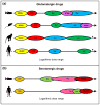Zebrafish as an emerging model for studying complex brain disorders
- PMID: 24412421
- PMCID: PMC3913794
- DOI: 10.1016/j.tips.2013.12.002
Zebrafish as an emerging model for studying complex brain disorders
Abstract
The zebrafish (Danio rerio) is rapidly becoming a popular model organism in pharmacogenetics and neuropharmacology. Both larval and adult zebrafish are currently used to increase our understanding of brain function, dysfunction, and their genetic and pharmacological modulation. Here we review the developing utility of zebrafish in the analysis of complex brain disorders (including, e.g., depression, autism, psychoses, drug abuse, and cognitive deficits), also covering zebrafish applications towards the goal of modeling major human neuropsychiatric and drug-induced syndromes. We argue that zebrafish models of complex brain disorders and drug-induced conditions are a rapidly emerging critical field in translational neuroscience and pharmacology research.
Keywords: behavioral tests; brain disorders; translational research; zebrafish.
Copyright © 2013 Elsevier Ltd. All rights reserved.
Figures





References
-
- Lopes da Fonseca T, et al. The zebrafish homologue of Parkinson’s disease ATP13A2 is essential for embryonic survival. Brain Res Bull. 2013;90:118–126. - PubMed
-
- Suen MF, et al. Assessments of the effects of nicotine and ketamine using tyrosine hydroxylase-green fluorescent protein transgenic zebrafish as biosensors. Biosens Bioelectron. 2013;42:177–185. - PubMed
-
- Gerlai R. A small fish with a big future: zebrafish in behavioral neuroscience. Reviews in the neurosciences. 2011;22:3–4. - PubMed
Publication types
MeSH terms
Grants and funding
LinkOut - more resources
Full Text Sources
Other Literature Sources
Medical

